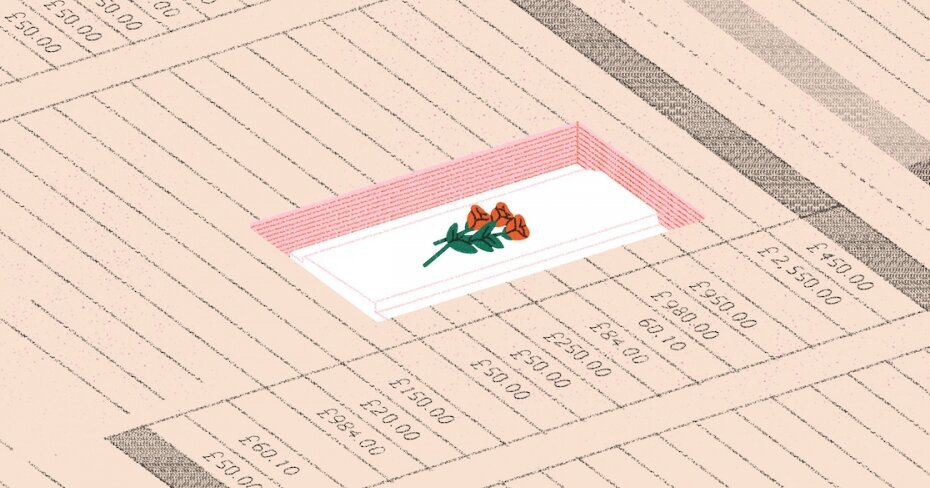I wouldn’t ask for financial help. Then came my dad’s funeral bill
By: Iqra Choudhry on September 30, 2020
Money is wrapped up in all kinds of unpleasant emotions. Shame, embarrassment, fear, regret. We all experience these feelings about our money at one time or another, but we’ll be damned if we actually talk about it. To help eliminate the stigma around making mistakes with our money, or feeling scared about our financial security, we’re introducing Financially Naked — a series where people have the space to bare all about their most vulnerable financial experiences, mistakes, and regrets. Because let's face it: we all have them.
It's July 2015, and I’m sitting in my doctor’s waiting room in Newcastle, U.K., with two broken fingers, some temporary nerve damage, and just £20 left to get me through the month. A couple of weeks earlier, I fell off my bike in the park and caught my hand between the mud guard and the hard concrete. The result was painful, colourful, and rendered me useless at my barista job. When I’d arrived in the emergency room after the incident, I was told I’d need to be off work completely for at least six weeks. I paid for a note to access government sick pay, but it was nowhere near enough to cover my rent let alone other bills. After a week-and-a-half of trying to live on it, I’d realised I needed to keep working. So here I was back in the doctor’s office to ask for a letter that said I could return to my job.
There was other financial stress weighing on my mind. Ten months earlier, my father died suddenly of a heart attack. At the age of 20, I was the one who found him. I was the one who called the ambulance, heart sinking as I desperately performed chest compressions, instructed by the woman over the phone until the paramedics arrived. I was still reeling from the grief of his passing, but also the financial hit that came with it, since I helped my mother and sister pay for his funeral.
It had cost about £6,000, all in all, for a post-mortem MRI (Muslims avoid autopsies whenever we can), a plot in the graveyard, a casket, a headstone, and to transport him to his resting place. I insisted that we split the costs equally three ways even though I didn’t really have the money. I cleaned out my meagre savings — a decision that left me flat broke and scraping by for the better part of a year trying to manage my expenses and send my mother monthly payments to cover my share of the bill. In order to do that, I’d relied on my £2,000 line of credit (known as an “overdraft” here in the U.K.). I’d become so tied up in wanting to be able to pay my share of my father’s funeral costs that I sacrificed my financial health to meet that responsibility. I was young, stubborn and hurting. And I was too proud to ask for help.
I wanted to be there in the ways I still could — even if meant digging myself out of debt
I'm the oldest daughter of Pakistani parents who raised me never to ask anyone for money. Growing up, my mother and father eked out a living off of their own backs, first in Denmark and then in the U.K. They both worked multiple low-paying jobs: as a cleaner, as a canteen worker in the local primary school, a factory worker on the night shift, and as a taxi driver shuttling drunk students back and forth in the days before Uber. My parents are the sort of people who would rather cut back on essentials than ask a family member for a loan. But when it came to lending other folks money, they were unerringly generous. I realize now that I am the same. It’s near impossible for me to ask for financial help, but if a friend needs it, I’ll empty out my savings account before I’ve been asked.
By the time I busted up my hand, I’d already used several hundred dollars of my overdraft to cover the funeral costs. Then there was the £900 I’d borrowed in the days after the accident because of an awkward rent payment plan where I didn’t pay at the start of the academic year, but paid double in July. And the £150 I had to pay for new glasses. It felt like one financial hit after the other. My bills were piling up and I watched, heart sinking, as my account balance went further into the red.
Back at the doctor’s office, I ask my physician to sign paperwork that says I’m fit to return to work. He looks at my hand in its thick cast, fingers mottled with bruises still, and laughs. “Miss, you’re in no fit condition to go back to work,” he tells me. I look down, embarrassed. He’s right. Just the night before, I’d spent 20 minutes trying to single-handedly use a can-opener to no avail. But I have to argue with him because I only have £20 and all I’ve eaten for three days are some leftover croissants from the coffee shop and dry toast.
I promised myself that if I ever found myself in the same position again, I’d ask for help
"Look, just ask your parents to pay your rent, it's no big deal,” he says. “I’ve got a son about your age, he’s at medical school, he asks me for money all the time!”
I want to scream at him. If my dad had been alive, I probably would have asked him for help. But then if my dad had been alive, I wouldn’t have been in such dire financial straits. “Well, one of my parents is dead,” I hiss. “And the other one needs my help financially. So your son is lucky to be able to rely on daddy for rent, but we can’t all do it.”
It was harsh, rude, and unnecessary, but the knowing look slid off his face, and he signed my return-to-work letter. And that was that. I was back in the shop the next day, making coffee with one hand. I stuck it out on that £20 until payday, not realizing that the university had money set aside for students in financial difficulty, or that I could have gone to a food bank. I was too proud to even consider these options. When my dad passed, I became a second parental figure to my siblings. I was also torn up about returning to university in Newcastle away from my family in Manchester after the funeral, and I wanted to be there in the ways I still could — even if meant digging myself out of debt.
Maybe my insisting on helping out with the funeral costs was my way of emulating my father, and the way he never let anyone want for help. It was a decision that taught me a lot about myself, about money, and about my own ego. The next month, I began slowly clawing my way out of my overdraft, working every hour I could to put that all-important buffer between me and another month like that. It took me two years to pay back the debt in full. Looking back, I don’t really know how I did it. But what I do know is this: most of us are just a month away from our worst financial reality, and I promised myself that if I ever found myself in the same position again, I’d ask for help.
The headstone we picked out for my father is inscribed with words I’d written to describe the wonderful person we’d lost. When we visit his grave, I’m filled with a sense of pride — only this time, it’s the good kind.
Illustration by Jeannie Phan.


